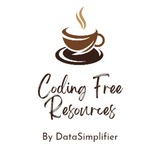5 Handy Tips to master Data Science ⬇️
1️⃣ Begin with introductory projects that cover the fundamental concepts of data science, such as data exploration, cleaning, and visualization. These projects will help you get familiar with common data science tools and libraries like Python (Pandas, NumPy, Matplotlib), R, SQL, and Excel
2️⃣ Look for publicly available datasets from sources like Kaggle, UCI Machine Learning Repository. Working with real-world data will expose you to the challenges of messy, incomplete, and heterogeneous data, which is common in practical scenarios.
3️⃣ Explore various data science techniques like regression, classification, clustering, and time series analysis. Apply these techniques to different datasets and domains to gain a broader understanding of their strengths, weaknesses, and appropriate use cases.
4️⃣ Work on projects that involve the entire data science lifecycle, from data collection and cleaning to model building, evaluation, and deployment. This will help you understand how different components of the data science process fit together.
5️⃣ Consistent practice is key to mastering any skill. Set aside dedicated time to work on data science projects, and gradually increase the complexity and scope of your projects as you gain more experience.
1️⃣ Begin with introductory projects that cover the fundamental concepts of data science, such as data exploration, cleaning, and visualization. These projects will help you get familiar with common data science tools and libraries like Python (Pandas, NumPy, Matplotlib), R, SQL, and Excel
2️⃣ Look for publicly available datasets from sources like Kaggle, UCI Machine Learning Repository. Working with real-world data will expose you to the challenges of messy, incomplete, and heterogeneous data, which is common in practical scenarios.
3️⃣ Explore various data science techniques like regression, classification, clustering, and time series analysis. Apply these techniques to different datasets and domains to gain a broader understanding of their strengths, weaknesses, and appropriate use cases.
4️⃣ Work on projects that involve the entire data science lifecycle, from data collection and cleaning to model building, evaluation, and deployment. This will help you understand how different components of the data science process fit together.
5️⃣ Consistent practice is key to mastering any skill. Set aside dedicated time to work on data science projects, and gradually increase the complexity and scope of your projects as you gain more experience.
❤2
DS INTERVIEW.pdf
16.6 MB
800+ Data Science Interview Questions – A Must-Have Resource for Every Aspirant
Breaking into the data science field is challenging—not because of a lack of opportunities, but because of how thoroughly you need to prepare.
This document, curated by Steve Nouri, is a goldmine of 800+ real-world interview questions covering:
Breaking into the data science field is challenging—not because of a lack of opportunities, but because of how thoroughly you need to prepare.
This document, curated by Steve Nouri, is a goldmine of 800+ real-world interview questions covering:
-Statistics
-Data Science Fundamentals
-Data Analysis
-Machine Learning
-Deep Learning
-Python & R
-Model Evaluation & Optimization
-Deployment Strategies
…and much more!
❤3
